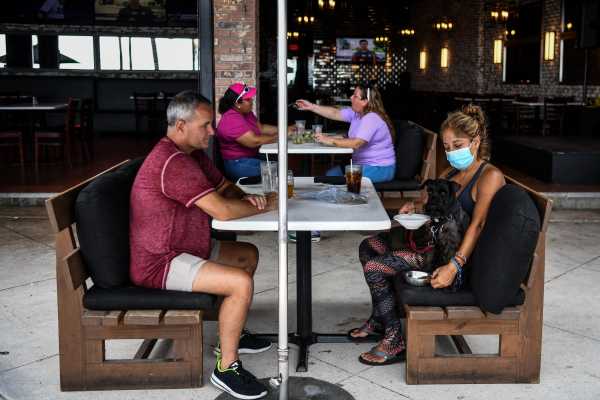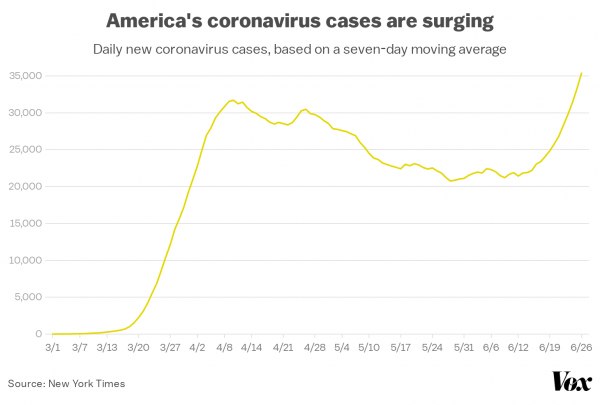
A growing number of Americans of both political parties believe the worst of the coronavirus pandemic is over, even as the number of daily new cases is rapidly increasing nationwide.
A new survey from the Pew Research Center found that 40 percent of Americans now believe the worst of Covid-19 is in the past, up from 26 percent in early April. That number includes the majority of Republicans, 61 percent of whom said the country has already suffered the worst of the pandemic.
Overall, the survey — taken June 16 to 22, featuring 4,708 American adults and a 1.8 percentage point margin of error — found a strikingly deep ideological divide between how Republicans and Democrats think about the continued threat of the virus.
Democrats were much more likely to say they’re worried they may get Covid-19 and need to be hospitalized; that they might spread the virus to other people; and that they’re uncomfortable going to salons, restaurants, sporting events, or social gatherings. For instance, the study found 65 percent of Republicans are now comfortable eating in a restaurant, compared to 28 percent of Democrats.
This divide is one that is reflected in the clear difference in public officials’ response to the coronavirus. President Donald Trump has long downplayed the threat posed by Covid-19, and has pushed states to reopen nonessential businesses. That push was — until recently — widely embraced by his allies at the state level. Some states with Republican governors, however, like Texas and Florida, have begun to scale back those reopenings amid increasing case counts.
Many Democrats, on the other hand, have argued for a more cautious reopening, with some, like House Speaker Nancy Pelosi and presumptive Democratic presidential nominee Joe Biden, arguing for mandating the wearing of masks in public.
Beyond partisan leanings, the study also found a racial divide in current attitudes on Covid-19, with Black and Latinx Americans more likely to fear infection than white Americans.
Sixty-three and 73 percent of Black and Latinx Americans, respectively, said they were at least somewhat concerned they would become infected and require hospitalization; 43 percent of white Americans said they had the same fear. Asymptomatic spread was also of greater concern to Black and Latinx respondents; 72 percent of Black Americans and 79 percent of Latinx Americans were found to be at least somewhat concerned about being asymptomatic carriers, compared to 56 percent of white Americans with the same concern.
These findings reflect the work of multiple other studies showing that people’s political beliefs are one of the largest indicators of how they respond to the pandemic — as well as data and analyses that show Americans of color are more likely to be infected and die of Covid-19 than white Americans.
The study also revealed that Americans, overall, are united in one thing: They’re less scared now than they were in April.
Coronavirus cases are actually surging nationwide
Americans still have a lot of cause for concern, however. After nearly two months of declining coronavirus cases across the US, cases have skyrocketed again over the last two weeks. Between June 22 and 26, the country went from having fewer than 25,000 new cases per day to more than 45,000. Friday, the US recorded its greatest one-day increase in confirmed cases, documenting 45,498 new cases, according to the New York Times.

States like Arizona, Florida, and Texas and others throughout the South have been among the hardest hit. Texas, one of the first states to begin reopening nonessential businesses, and Florida have already begun reversing their economic reopenings in response to the increase in cases. On Friday, when Florida saw nearly 9,000 new cases and Texas nearly 6,000, both states ordered bars shuttered.
As Vox’s German Lopez has explained, many states never actually controlled their outbreaks before reopening sectors of their economy: The public was sent back into offices, restaurants, bars, and salons nationwide as the coronavirus was still circulating in their communities, leading to rising cases.
“It’s a situation that didn’t have to be,” Jaime Slaughter-Acey, an epidemiologist at the University of Minnesota, told Lopez, adding that states failed to “be proactive with respect to mitigating the Covid-19 pandemic and to help normalize culture to adopt practices that would stem the tide of transmissions as well as the development of Covid-19 complications.”
Not all states have begun to see a spike in new infections — many of the states hit the hardest in the beginning of the pandemic, such as New York, New Jersey, and Connecticut, have been spared the increases. While this could be attributed to a number of factors, epidemiologists believe these states have avoided large new caseloads by implementing strict social distancing policies and by promoting the wearing of masks.
As Lopez reports, what’s most important, experts say, is taking reopenings slowly. Because of the way the coronavirus manifests in humans, it can take two weeks — if not longer — to see the impact of any one change in policy. Many experts recommend states be prepared to rapidly reintroduce restrictions when they see cases spike.
Lauren Meyers, a mathematical biologist at the University of Texas Austin, told Lopez: “Relax things bit by bit, and see if it’s working. If we relax a few measures, we watch the data for a few weeks; if it’s not going up, maybe we can relax a bit more.”
For now, however, the figures suggest it is not yet time to relax, and that the worst is not behind the US.
Support Vox’s explanatory journalism
Every day at Vox, we aim to answer your most important questions and provide you, and our audience around the world, with information that has the power to save lives. Our mission has never been more vital than it is in this moment: to empower you through understanding. Vox’s work is reaching more people than ever, but our distinctive brand of explanatory journalism takes resources — particularly during a pandemic and an economic downturn. Your financial contribution will not constitute a donation, but it will enable our staff to continue to offer free articles, videos, and podcasts at the quality and volume that this moment requires. Please consider making a contribution to Vox today.
Sourse: vox.com






